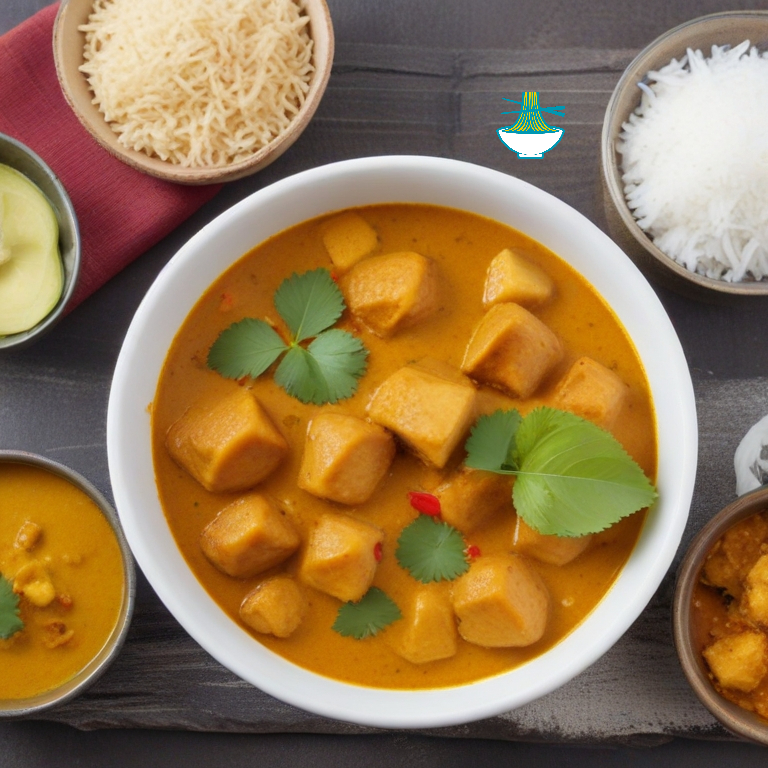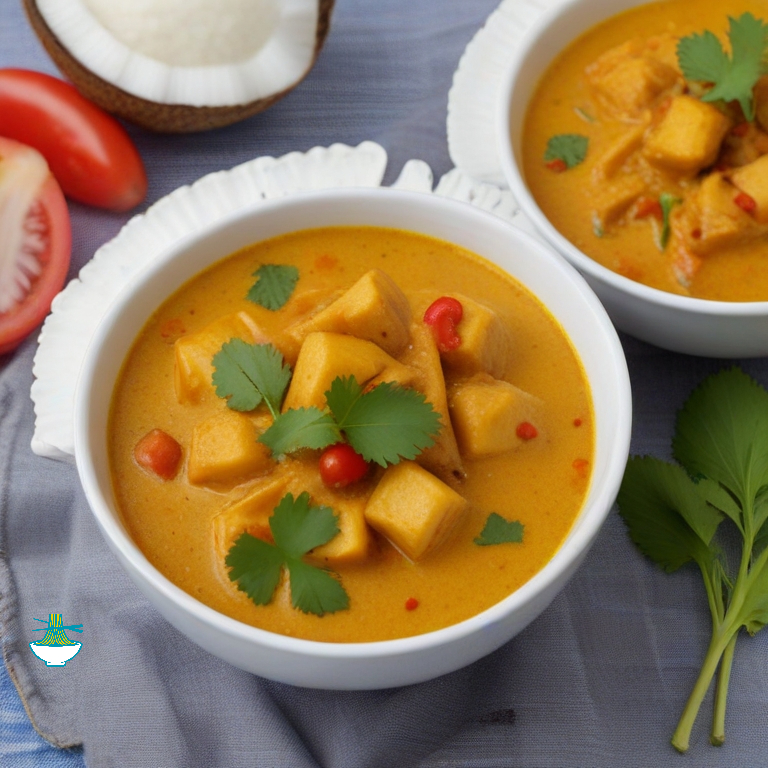This delightful coconut-based curry recipe offers a tantalizing blend of flavors, combining creamy coconut milk with aromatic spices and your choice of protein or vegetables. Originating from South Asian cuisine, coconut-based curries have a rich history of using coconut milk as a base to create luscious, flavorful dishes.
Historically, coconut-based curries have been a staple in countries like India, Thailand, and Indonesia, where coconut trees thrive and contribute significantly to local cuisine. The use of coconut milk adds a creamy texture and a subtle sweetness to the curry, balancing perfectly with the spices and ingredients.
This recipe's versatility allows you to customize it with your preferred protein, such as chicken, shrimp, tofu, or a variety of vegetables like cauliflower or potatoes. The blend of curry powder, turmeric, cumin, and coriander creates a harmonious balance of flavors, making this dish a favorite among those who appreciate bold yet comforting meals.
Whether enjoyed with steamed rice, naan bread, or other accompaniments, this coconut-based curry promises a satisfying dining experience that celebrates the richness of South Asian culinary traditions.

Ingredients:
- 1 can (400ml) coconut milk
- 2 tablespoons oil
- 1 onion, finely chopped
- 2 cloves garlic, minced
- 1 tablespoon ginger, grated
- 2 teaspoons curry powder
- 1 teaspoon turmeric powder
- 1 teaspoon cumin powder
- 1 teaspoon coriander powder
- Salt to taste
- 1 pound (450g) protein or vegetables of your choice (chicken, shrimp, tofu, cauliflower, etc.)
- Fresh cilantro for garnish
Instructions:
1. Heat oil in a pan over medium heat. Add the chopped onion and sauté until translucent.
2. Add minced garlic and grated ginger. Cook for another minute until fragrant.
3. Stir in curry powder, turmeric, cumin, and coriander powders. Cook for a few seconds to release the flavors.
4. Pour in the coconut milk and bring to a simmer.
5. Add your choice of protein or vegetables to the simmering coconut milk mixture. Cook until the protein is cooked through or the vegetables are tender.
6. Season with salt to taste.
7. Garnish with fresh cilantro before serving.
Enjoy your flavorful coconut-based curry!
Nutrition Value:
1. Coconut Milk (1 can - 400ml)
- Calories: Approximately 960 kcal
- Carbohydrates: About 32 grams
- Protein: Around 8 grams
- Fat: Roughly 96 grams (mainly from saturated fat)
- Sodium: Varies based on brand, typically around 40-50 milligrams
- Cholesterol: Usually zero in coconut milk
- Vitamins & Minerals: Contains vitamins like B vitamins (B1, B3, B6) and minerals like manganese, copper, iron, magnesium, phosphorus, potassium, and zinc.
- Nutritional Benefit: Coconut milk provides healthy fats, essential nutrients, and a creamy texture to the curry.
2. Oil (2 tablespoons)
- Calories: Approximately 240 kcal
- Carbohydrates: Zero grams
- Protein: Zero grams
- Fat: About 28 grams (varies based on the type of oil used)
- Sodium: Typically zero unless added separately
- Cholesterol: Zero
- Vitamins & Minerals: Depends on the type of oil; generally provides vitamin E and some essential fatty acids.
- Nutritional Benefit: Adds flavor, aids in cooking, and contributes healthy fats.
3. Onion (1 medium, finely chopped)
- Calories: Approximately 44 kcal
- Carbohydrates: About 10 grams
- Protein: Around 1 gram
- Fat: Almost zero
- Sodium: Around 4 milligrams
- Cholesterol: Zero
- Vitamins & Minerals: Contains vitamin C, vitamin B6, folate, potassium, and manganese.
- Nutritional Benefit: Provides flavor, texture, and beneficial nutrients like antioxidants and vitamins.
4. Garlic (2 cloves, minced)
- Calories: Approximately 8 kcal
- Carbohydrates: About 2 grams
- Protein: Around 0.4 grams
- Fat: Almost zero
- Sodium: Around 1 milligram
- Cholesterol: Zero
- Vitamins & Minerals: Contains vitamin C, vitamin B6, manganese, and trace amounts of other nutrients.
- Nutritional Benefit: Adds flavor and provides antioxidants and potential health benefits.
5. Ginger (1 tablespoon, grated)
- Calories: Approximately 5 kcal
- Carbohydrates: About 1 gram
- Protein: Almost zero
- Fat: Almost zero
- Sodium: Around 1 milligram
- Cholesterol: Zero
- Vitamins & Minerals: Contains vitamin C, vitamin B6, potassium, magnesium, and other nutrients.
- Nutritional Benefit: Adds a spicy, aromatic flavor and provides potential anti-inflammatory and digestive benefits.
6. Curry Powder (2 teaspoons)
- Calories: Approximately 12 kcal
- Carbohydrates: About 2 grams
- Protein: Around 0.5 grams
- Fat: Almost zero
- Sodium: Varies based on brand, typically around 2-5 milligrams
- Cholesterol: Zero
- Vitamins & Minerals: Contains various spices like turmeric, coriander, cumin, and may include additional spices like fenugreek, cinnamon, etc.
- Nutritional Benefit: Adds a flavorful blend of spices and potential health benefits from ingredients like turmeric (curcumin).
7. Turmeric Powder (1 teaspoon)
- Calories: Approximately 9 kcal
- Carbohydrates: About 2 grams
- Protein: Around 0.2 grams
- Fat: Almost zero
- Sodium: Around 1 milligram
- Cholesterol: Zero
- Vitamins & Minerals: Contains curcumin, a compound with potential anti-inflammatory and antioxidant properties.
- Nutritional Benefit: Adds a golden color and potential health benefits, including anti-inflammatory effects.
8. Cumin Powder (1 teaspoon)
- Calories: Approximately 8 kcal
- Carbohydrates: About 1 gram
- Protein: Around 0.4 grams
- Fat: Almost zero
- Sodium: Around 1 milligram
- Cholesterol: Zero
- Vitamins & Minerals: Contains iron, manganese, and other nutrients.
- Nutritional Benefit: Adds a warm, earthy flavor and potential digestive benefits.
9. Coriander Powder (1 teaspoon)
- Calories: Approximately 5 kcal
- Carbohydrates: About 1 gram
- Protein: Almost zero
- Fat: Almost zero
- Sodium: Around 1 milligram
- Cholesterol: Zero
- Vitamins & Minerals: Contains vitamin C, vitamin K, potassium, manganese, and other nutrients.
- Nutritional Benefit: Adds a citrusy, aromatic flavor and potential digestive and antioxidant benefits.
10. Salt (to taste)
- Calories: Zero
- Carbohydrates: Zero
- Protein: Zero
- Fat: Zero
- Sodium: Varies based on the amount added
- Cholesterol: Zero
- Vitamins & Minerals: None
- Nutritional Benefit: Enhances flavor; use in moderation to control sodium intake.
11. Protein or Vegetables (1 pound - 450g)
- Calories, carbohydrates, protein, fat, sodium, cholesterol, vitamins, and minerals vary based on the choice of protein or vegetables used. For example:
- Chicken breast (1 pound): Approximately 450 kcal, 0 grams carbs, 90 grams protein, 10 grams fat, 150 milligrams sodium, 260 milligrams cholesterol, contains vitamins like B6, B12, niacin, and minerals like phosphorus, selenium, zinc.
- Tofu (1 pound): Approximately 340 kcal, 8 grams carbs, 40 grams protein, 20 grams fat, 10 milligrams sodium, 0 milligrams cholesterol, contains vitamins like calcium, iron, magnesium, and minerals like manganese, copper.
- Cauliflower (1 pound): Approximately 100 kcal, 20 grams carbs, 5 grams protein, 1 gram fat, 80 milligrams sodium, 0 milligrams cholesterol, contains vitamins like vitamin C, vitamin K, folate, and minerals like potassium, manganese.
12. Fresh Cilantro (for garnish)
- Calories: Almost zero
- Carbohydrates: Almost zero
- Protein: Almost zero
- Fat: Almost zero
- Sodium: Almost zero
- Cholesterol: Zero
- Vitamins & Minerals: Contains vitamin K, vitamin C, potassium, and other nutrients.
- Nutritional Benefit: Adds freshness, flavor, and a touch of vitamins and minerals.
These values are approximate and can vary based on the specific brands and quantities used. Adjustments may be needed based on dietary preferences and nutritional goals.


Comments